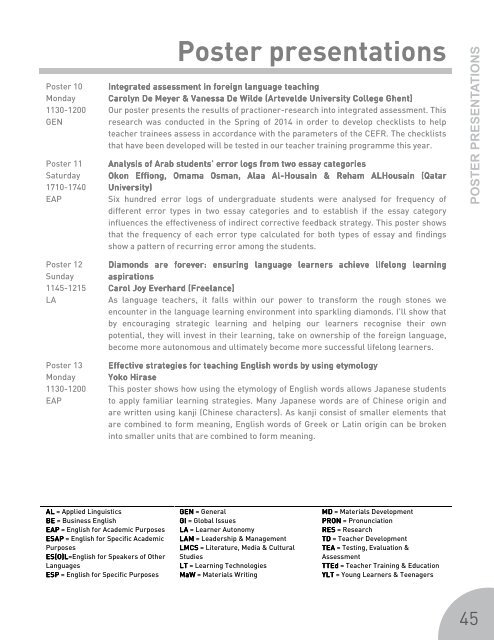You also want an ePaper? Increase the reach of your titles
YUMPU automatically turns print PDFs into web optimized ePapers that Google loves.
Poster 10<br />
Monday<br />
1130-1200<br />
GEN<br />
Poster 11<br />
Saturday<br />
1710-1740<br />
EAP<br />
Poster presentations<br />
Integrated assessment in foreign language teaching<br />
Carolyn De Meyer & Vanessa De Wilde (Artevelde University College Ghent)<br />
Our poster presents the results of practioner-research into integrated assessment. This<br />
research was conducted in the Spring of 2014 in order to develop checklists to help<br />
teacher trainees assess in accordance with the parameters of the CEFR. The checklists<br />
that have been developed will be tested in our teacher training programme this year.<br />
Analysis of Arab students’ error logs from two essay categories<br />
Okon Effiong, Omama Osman, Alaa Al-Housain & Reham ALHousain (Qatar<br />
University)<br />
Six hundred error logs of undergraduate students were analysed for frequency of<br />
different error types in two essay categories and to establish if the essay category<br />
influences the effectiveness of indirect corrective feedback strategy. This poster shows<br />
that the frequency of each error type calculated for both types of essay and findings<br />
show a pattern of recurring error among the students.<br />
POSTER PRESENTATIONS<br />
Poster 12<br />
Sunday<br />
1145-1215<br />
LA<br />
Poster 13<br />
Monday<br />
1130-1200<br />
EAP<br />
Diamonds are forever: ensuring language learners achieve lifelong learning<br />
aspirations<br />
Carol Joy Everhard (Freelance<br />
Freelance)<br />
As language teachers, it falls within our power to transform the rough stones we<br />
encounter in the language learning environment into sparkling diamonds. I'll show that<br />
by encouraging strategic learning and helping our learners recognise their own<br />
potential, they will invest in their learning, take on ownership of the foreign language,<br />
become more autonomous and ultimately become more successful lifelong learners.<br />
Effective strategies for teaching English words by using etymology<br />
Yoko Hirase<br />
This poster shows how using the etymology of English words allows Japanese students<br />
to apply familiar learning strategies. Many Japanese words are of Chinese origin and<br />
are written using kanji (Chinese characters). As kanji consist of smaller elements that<br />
are combined to form meaning, English words of Greek or Latin origin can be broken<br />
into smaller units that are combined to form meaning.<br />
AL = Applied Linguistics<br />
BE = Business English<br />
EAP = English for Academic Purposes<br />
ESAP = English for Specific Academic<br />
Purposes<br />
ES(O)L=English for Speakers of Other<br />
Languages<br />
ESP = English for Specific Purposes<br />
GEN = General<br />
GI = Global Issues<br />
LA = Learner Autonomy<br />
LAM = Leadership & Management<br />
LMCS = Literature, Media & Cultural<br />
Studies<br />
LT = Learning Technologies<br />
MaW = Materials Writing<br />
MD = Materials Development<br />
PRON = Pronunciation<br />
RES = Research<br />
TD = Teacher Development<br />
TEA = Testing, Evaluation &<br />
Assessment<br />
TTEd = Teacher Training & Education<br />
YLT = Young Learners & Teenagers<br />
45


